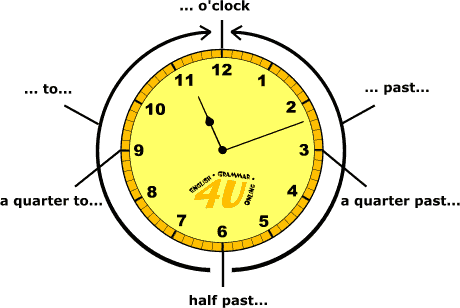There are two common ways of telling the time.
Formal but easier way
Say the hours first and then the minutes.
Example: 7:45 – seven forty-five
For minutes 01 through 09, you can pronounce the ‘0’ as oh.
Example: 11:06 – eleven (oh) six
More popular way
Say the minutes first and then the hours. Use past and the preceding hour for minutes 01 through 30. Use to and the forthcoming hour for minutes 31 through 59.
Example: 7.15 – fifteen minutes past seven
Example: 7.45 – fifteen minutes to eight
Another possibility of saying ’15 minutes past’ is: a quarter past
Another possibility of saying ’15 minutes to’ is: a quarter to
Another possibility of saying ’30 minutes past’ is: half past
Example: 5:30 – half past five
Watch

Note
Use o’clock only at the full hour.
Example: 7:00 – seven o’clock (but 7:10 – ten past seven)
In English ordinary speech, the twelve-hour clock is used.
Example: 17:20 – twenty past five
For times around midnight or midday you can use the expressions midnight or midday / noon instead of the number 12.
Example: 00:00 – midnight
Example: 12:00 – midday or noon
To make clear (where necessary) whether you mean a time before 12 o’clock noon or after, you can use in the morning, in the afternoon, in the evening, at night. Use in the morning before 12 o’clock noon, after 12 o’clock noon use in the afternoon. When to change from afternoon to evening, from evening to night and from night to morning depends on your sense of time.
Example: 3:15 – a quarter past three in the morning or a quarter past three at night
More formal expressions to indicate whether a time is before noon or after are a.m. (also: am – ante meridiem, before noon) and p.m. (also: pm – post meridiem, after noon). Use these expression only with the formal way of telling the time.
Example: 3:15 – three fifteen a.m.
It is not usual to use a.m. and p.m. with past/to.
Example: 3:15 – fifteen minutes past three or a quarter past three
American English
Beside past Americans often use after.
Example: 06:10 – ten past/after six
But: in time expressions with half past it is not usual to replace past by after.
Beside to Americans often use before, of or till.
Example: 05:50 – ten to/before/of/till six
https://www.ego4u.com/en/cram-up/vocabulary/time









